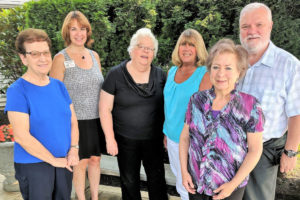This article was originally published in the Lynden Tribune.
LYNDEN — Five years after its inception, the care transitions program at Christian Health Care Center recently celebrated a major milestone, helping its 500th patient successfully transition from a hospital stay to life as usual.
Every week, a handful of Whatcom County seniors leave CHCC’s short-stay rehabilitation program with no need to fear what’s next, because one of a team of dedicated nurses is guiding them from hospital through rehab to life back in their own environment, smoothing as many potential bumps as possible.
Some were in the hospital for hip or knee replacements. Others had heart problems or lung diseases. Nearly all of them, thanks to the helping hand of CHCC’s care transitions program, are able to ease smoothly back into the flow of life without major complications.

The proof is in the numbers. Among the biggest metrics of success for the program is the percentage of people helped who don’t need a return visit to the hospital. Nationwide, roughly 25 percent of people are readmitted to the hospital within 45 days, says Steve Wallace, CHCC’s social services director. In CHCC’s care transitions program, that number is a mere 3.97 percent.
The program’s success over five years, Wallace calculates, translates to a savings for the Medicare system of approximately $1.6 million in unspent hospital charges.
But there’s an even more important evidence of the care transitions program’s worth — the happiness of the program’s many patients.
In a recent survey, 100 percent of the care transitions patients who responded said they felt more confident in their ability to manage their health after meeting with a nurse. They also said the services received helped them to manage their health better.
Typical participants are Whatcom County seniors on Medicare who enter PeaceHealth St. Joseph Medical Center for things like surgeries, pulmonary disease or heart problems. The program, which is entirely free to CHCC residents, fills a critical gap in the sequence of care for them. After an average of 17 to 20 days in a therapeutic rehab setting, patients are physically able to resume life at home — but as national readmission rates show, they’re not always fully ready for life on their own or even with a family caregiver.
For those who struggle, salvation comes in the form of care transitions program nurses who help them understand their medications; assist with obtaining food, caregivers and other help; and even connect them with local resources for further assistance if desired.
“Much of the work is making it possible for individuals to remain at home,” Wallace says. “It is nice to help our patients by providing resource knowledge and linking them up to those resources. It’s also nice to help the patient with knowing how to talk to their doctors as well as getting their medications squared away.”
All five of the nurses in the program are retired RNs who have worked in a variety of health care settings, including acute surgical care, home health, hospice, health care research and education, according to program coordinator LeAna Osterman, herself a retired nurse.
“We frequently combine our experience to come up with solutions for the management of our clients’ needs,” she said. “And frequently we are helping the client’s caregiver and other family members, so the client can remain in their own home or retirement facility.”
The free service has proved to be a lifeline for the 500-plus patients seen thus far. Not only do they get free advice and assistance upon discharge, they also get much-needed reassurance from experienced nurses who’ve seen — and expertly handled — just about every situation.
The retired nurses greatly enjoy their return to nursing in a more relaxed role, Osterman said, with both nurses and patients appreciating the increased nurse/patient time.
Friendships often develop through these relationships, and in fact many people specifically request a nurse with whom they’ve previously had a beneficial experience.
Because Osterman and the other nurses use the program to mentor nursing students from Western Washington University, several generations often participate together, learning each other’s life stories and participating in each other’s success.
It’s not surprising, then, that survey respondents talked about a loving, understanding and caring environment in which nurses go above and beyond for their patients.
These personal touches help make the service a win for everyone, Wallace says. Not only do patients get to recover from a hospital stay in a top-notch rehabilitation center like Christian Health Care Center in Lynden, but when they leave they can feel confident in a successful transition home. And nurses get the satisfaction of helping seniors thrive after a hospital stay, rarely needing to return.
No matter the reason for hospitalization, a short stay at CHCC’s therapeutic rehab unit followed by the helping hand of an experienced nurse is proving to be a great way to recover quickly and ease painlessly back into the flow of life.
“Each of us have had some unique and memorable experiences caring for these folks,” Osterman says. “And each of us goes out of our way to improve the quality of their care by encouraging them and finding the resources they need.”
For additional information about CHCC’s care transitions program, call Steve Wallace at 360-354-4434.
